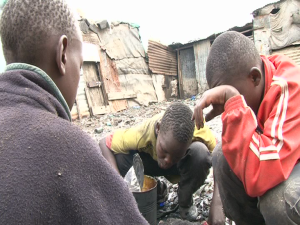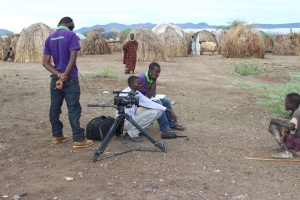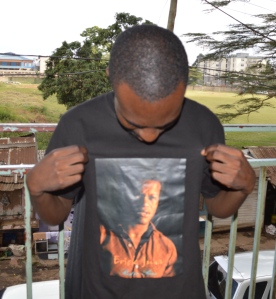By Maurice Oniang’o
Sugarcane farming in Kenya is viewed as a prestigious venture in areas it is grown yet most of those who depend only on it live in abject poverty. Currently there are more than 250,000 small holder farmers in the country, who supply over 92 percent of sugarcane processed by millers.
The sugar industry has been facing a myriad of problems some of which have now trickled down to farmers, impoverishing them more and causing many of them to do away with sugarcane farming. A cross section of farmers that I spoke to believe that the industry is headed towards downfall if various stakeholders do not come to its rescue.
Fifty Eight year old Protus Echesa has been doing sugarcane farming for over three decades in Mumias, Kakamega County, home to Mumias Sugar Company, Kenya’s biggest sugar miller. Echesa is a farmer contracted by Mumias Sugar Company which means he provides land and the factory provides farm input which is deducted after harvesting. He says that sugarcane farming today is less lucrative as compared to when he started it. “When I started sugarcane faming back in the 1980’s, we used to be paid less but the payments were consistent, today we are get nothing,” Said Echesa.
One of the challenges he and other farmers face is delay in payments and high interest rates. He says that initially they used to be paid a fortnight after supplying but nowadays payments may take up to five months and above. “If you supply sugarcane and they take five months to pay you, how are you going to pay school fees, how are you going to carter for your family needs?” he questions. The father of four has been depending on sugarcane farming for his family upkeep. His eldest daughter is currently in university, another in high school and the rest in primary school.

Protas Echesa contracted farmer by Mumias Sugar Company
Echesa shows me one of his statements which he supplied approximately 87 tons of sugarcane at a cost of 3200 shillings. This earned him about 278,000 shillings but the deductions and interest totaled to 273,000 shillings. He blames the factory for charging poor farmers exorbitant interest rates.
“I have been chasing payments for this statement and five months later I have not received a penny not to mention that it is only 5000 shillings from a total of 273,000 shillings, so how do I provide for my family?” added a disappointed Echesa. He has made endless trips to the factory but none bore fruits.
The story of delayed payments is told by many of the farmers in Mumias. Another challenge that farmers in Mumias face is the issue of debit returns or DR are commonly known there. A debit return means that the total amount of deductions by the factory for input supplied to a farmer and interest accrued is more than the total amount a farmer is supposed to earn leaving the farmer in debt.
This has become a phenomenon in the area and almost all farmers in the area have at one time or another received a debit return. They accuse the factory of foul play.

Echesa going through one of his statements with writer-Photo by Job Amenya

Echesa’s statement from which he was paid approximately 5000 shillings from the initial gross of over 200,000 shillings. Click to see details -Photo Maurice Oniang’o
Among the issues they raise include; the factory refusing to weigh the sugarcane on the farm, the factory weighing the sugarcane in their absence, high cost and poor transport from the farm to factory which causes cane spillage, faulty weigh bridges at the factory and corrupt factory officials.
Echesa too has not been spared. He supplied sugarcane worth approximately 86,000 shillings but the total deduction on farm input and interest accrued totaled approximately 96,000 shillings. “So when I went to collect my statement I was told that I owe the factory 10,000 shillings,’ he adds. This prompted him to diversify farming. He now does dairy and maize farming but still holds on to a large of sugarcane farm with the hope that the industry will improve and farmers will start making profits.

Statement indicating that Echesa owes Mumias Sugar Company approximately 10,000 shillings for sugarcane he supplied the miller. Click to see details-Photo Maurice Oniang’o
Farmers point at the lack of a strong sugarcane farmers union as one of the major cause of their woes. For instance Mumias farmers used to have a very strong organization called Mumias Out growers Company (MOCO) which they alleged was destroyed by corruption and selfish interests of its official.
According to Richard Ogendo, the Secretary General of Kenya Sugarcane Growers Association (KESGA), the industry is ailing because of various issues which include; high cost of production, dilapidated infrastructure, high taxation and weak regulations that do not protect the farmer. “We are in this state today because of the weak regulations that do not protect the farmer.” Said Ogendo. He adds that sugarcane farming does not make economic sense because the production cost for farmers is higher than what they get paid. “Currently we are being paid 3200 shillings per ton and our production cost is 3410 shillings per ton, but farmers never sit down to do the mathematics of money and time invested in their farms,” he added.
The KESGA Secretary General adds that the industry suffers a lot because of unregulated importation of cheap sugar and snuggling of sugar through various border points which flood the market denying local millers a chance in the market. He says that laxity by the industry’s regulator and corrupt powerful individuals is the reason for this. “For instance there is a lot of illegal sugar that comes in through Garissa, it passes over 15 roadblocks and still makes it to the supermarket shelves,” he quips.
Mumias East MP Ben Washiali concurs with the KESGA secretary general. The MP said that to revive the industry the influx of untaxed and contraband sugar we need strict and working regulations. Speaking to us at parliament grounds, the MP in whose constituency Mumias sugar company is said that his people suffer because of corruption.
“How do we import sugar that we need? Why do we not tax industrial sugar? You walk into a supermarket and you will find branded sugar yet they are not manufacturers,” says Washiali. He adds that some of this sugar packed and branded by local retail stores might be the untaxed and contraband sugar brought in from low cost producer nations. In Kenya production of one tone of sugar costs about 49,300 shillings while in Malawi it costs approximately 25,000 shillings. Some of this sugar is smuggled into the country. Early last year the Kenya Sugar Board seized 46,000 bags of imported duty free sugar worth Sh184 million.

Mumias East MP Ben Washiali has been vocal on issues affecting the sugar sector-Photo Maurice Oniango
A spot check in leading retail stores reveals that most of them are selling sugar their branded sugar cheaper than branded sugar by millers. For instance a 2KG sugar packed and labeled by various supermarkets ranged between 198 and 215 shillings while a 2 KG Mumias packaged sugar costs 240 shillings, Nzoia costs 225 shillings while Sony sugar costs 228 shillings.
The MP adds that when he took office in 2008 farmers were being paid 1800 shillings per ton and today they get paid 3200 shillings per ton but they take home negatives. “Farmers used to get money when cane was going for 1800 shillings per ton there must be something wrong that sugarcane is going at 3200 but farmers are getting DR’s,” He adds.
Speaking about the troubles faced by Mumias Sugar Company, the area MP says that the privatization process of the company has contributed to its problems. “When it was privatized we put the running of the factory into the hands of greedy people who looted the company’s resources jeopardizing other stakeholders,” he adds. He says that debit returns is a new way through which the miller is exploiting farmers in the area. He blames this on exorbitant transport rates, high interest rates as well as corrupt land surveyors. “We have a case where we resurveyed the farms belonging to farmers and where a farmer had an acre the surveyor had given them one and half or two acres. This affects the total earning of the farmer as they will be charged for the extra farm inputs they did not use,” he adds.
According to the now defunct Kenya Sugar Board list of registered sugar millers, we have nine sugar factories in the country. Among them Mumias Sugar Company, Nzoia Sugar Company, West Kenya Sugar Company, Butali Sugar Company, Chemilil sugar company, Muhoroni Sugar Company, South Nyanza Sugar company (SONY), Kibos Sugar and Allied Industry Ltd and Soin sugar company. We spoke to Nzoia Sugar Company Managing Director Saul Wasilwa to understand what his company and other millers face in the industry.

Stacks of 50 kg sacks of sugar in the warehouse on one of the sugar millers-Maurice Oniango
The MD says that the problems they face include old technology which causes high production costs, competition for sugarcane courtesy of new millers who entered the industry without having their own farmer’s base to sustain their productions, over taxation by the government and the issue of unregulated sugar which floods the market causing millers to operate on losses. “When you combine the issue of high cost of production, the effect of influx of contraband sugar then we are forced to delay paying farmers yet we are under obligation to pay them after 30 day but we are unable to pay them in time,” he says.
Even as millers complain of poor policies and the influx of illegal and unregulated importation of sugar as the genesis of their woes, they have come under sharp criticism from various quarters. For instance Mumias sugar company which is the biggest sugar factory in the country in terms of production and supply, has been facing a myriad of problems some of which is blamed on the management. Last year the company announced the sacking of it’s Chief Executive Peter Kibati. This was after an audit report by KPMG found him responsible for losses amounting to Sh1.1 billion, arising from the importation of sugar without the board’s approval. This also came at a time when the company recorded a loss of Sh.73 million in the six months that ended in December. The dwindling fortunes in the company resulted to its removal from NSE 20 Share Index firms by Nairobi Securities Exchange. The 20 share index is made up of 20 best performing blue chip companies on the NSE.
Analysts see this move by the NSE as harmful to the sugar sector. Steve Biko a market analyst says that the 20 share index is an index that covers all the sectors and removing Mumias Sugar Company means that the NSE is no longer tracking the performance of the sugar sector. He however says that the NSE had to do it considering the toxic levels Mumias shares had become in the market. “I think it was noble to remove them from the 20 share index so that they can go and put their house in order,” Said Biko. The company’s performance on the NSE has been slowly taking a dive from 55 shilling per share in 2008 to as low as 2.58 shillings today, about 20 fold decrement in share value. The shareholders bought the company’s shares at 49.50shillings from the State in a second IPO in 2007. The stock once touched a high of 55 shillings but that was not for long as it again touched an all time low of 2.30 shillings causing many shareholders to relinquish some of their shares at a loss.
As sugarcane farmers fault the millers for their misery in sugarcane farming and millers blame the national government for their tribulations in the sugar sector less has been said about county governments considering the fact that agriculture is now a devolved function. Nonetheless some of these county governments in sugar planting zones have been silently working to revive the sector. For instance in Kakamega County, a task force was formed to look into the issues facing the sugar sector and implementation of part of their report has started. The county assembly has also come up with a sugar bill that favors the farmers. According to Wycliffe Oparanya the governor Kakamega, over the year’s millers have had control of the sector giving room for them to exploit poor farmers. “At the moment the miller takes it all so we want a situation where we will separate the farmer from the miller,” said Oparanya. He says the dwindling fortune at Mumias Sugar Company has been caused by investing in various projects which have not broken even. Some of these projects include the ethanol plant, drinking water project and the generation of power project. He adds that the county government has already given the company 200 million shillings to pay the farmers their dues. He says this will be a revolving fund to the company in a bid to salvage it.

Richard Ogendo, Secretary General KESGA.
In September last year the government also released 1.1 billion shillings to pay sugarcane farmers whose factories have failed to pay them. However this did not go well with some stakeholders who feel that the government should address underlying issues affecting the sector rather than bailing out the millers every time they fail to pay farmers. “Farmers have gone without payment for more than five months. What we are seeing is tokenism you give factories money to pay farmers but you are not addressing the question what happened?” Says the Secretary General of KESGA.
Some stakeholders believe that sugarcane farming has become a political crop as the politics of the day dictate how farmers are treated. They point out that the industry witnessed a major positive change during the Kibaki’s era when the current Deputy President was the minister for agriculture. “When Moi was in power the industry suffered a lot then the Kibaki’s administration came in and Ruto really revived the industry but now the industry is at its lowest point and it seems like no one cares,” adds Ogendo.
Our efforts to reach Kenya Sugar Board to comment on the issues raised about the state of affairs in the industry futile as we were referred to the Agriculture, Fisheries and Food Authority (AFFA), a body recently formed through an act of parliament. AFFA takes over functions of ten agricultural parastatals among them the Kenya Sugar Board.
The contribution of the sugar industry on Kenya’s economy cannot be ignored as it employs about 10.7 million Kenyans who depend on it directly or indirectly for their livelihoods. The sub-sector accounts for about 15% of the agricultural Gross Domestic Product. The industry should be revived and the issues raised by various stakeholders looked into. This includes; strong regulations to curb cane poaching, the influx of untaxed and contraband sugar, improvement of technology used by millers, payment to farmers to be done on sucrose content rather than weight among others.
































